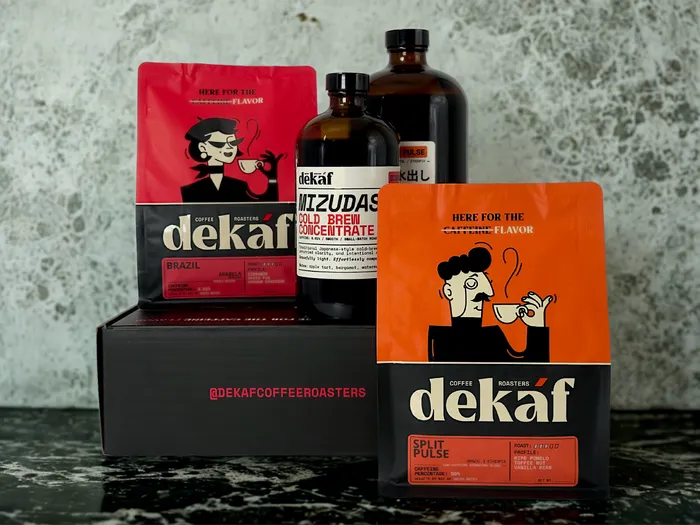
Photo Courtesy of: Dekáf Coffee Roasters
Image: Supplied
Decaf coffee drinkers have always been present. They just have not been heard. In cafes across the world, people ask for a cup without caffeine and receive whatever happens to be on hand. Often it is stale, over-roasted, or chemically stripped of both buzz and character. The coffee industry looked the other way, assuming that decaf drinkers were few and forgiving.
Anil Mezini and Khanh Nguyen were not willing to overlook them. What they heard, again and again, from customers, friends, and fellow coffee lovers was that people wanted to enjoy coffee—real coffee—without caffeine. And they wanted that experience to be flavourful, varied, and worthy of their time. The feedback was honest. The demand was clear.
“We kept hearing frustration,” Mezini said. “People were saying they loved coffee, but they couldn’t find decaf that was fresh, or decaf that had complexity. It felt like nobody was making it for them.” What started as an observation grew into a purpose. Together, Mezini and Nguyen built Dekáf Coffee Roasters to prove that great coffee does not depend on caffeine. It depends on care, sourcing, and the willingness to do the hard work others avoid.
Why decaf deserves its own space
Dekáf is more than a response to a neglected audience. It is a fully realised specialty coffee company that just happens to focus on caffeine-conscious offerings. Located in Salem, Massachusetts, it is operated entirely by Mezini and Nguyen. Every bag of coffee, every roast curve, every label, and every customer message begins and ends with them.
What makes Dekáf different is not a single decision. It is a series of deliberate ones. The company sources beans from multiple origins, cups and tests every batch, and builds custom roast profiles for each coffee. They use different roasting equipment depending on the caffeine level. Their Ghibli R15 roasts decaf exclusively. Their Loring Kestrel is reserved for low-caffeine blends. Even their Ikawa Pro100 exists to test roast profiles before anything touches the production roaster.
“We didn’t want decaf to be an add-on,” Nguyen explains. “We wanted it to have its own roaster, its own process, its own attention. That’s what real inclusion looks like.” The result is a catalog that now includes over 15 options across single origins, signature blends, espresso roasts, and cold brew concentrates. Most decaf companies stop at two or three. Dekáf offers depth and range because it believes flavour should never be limited by caffeine content.
Craft as an act of respect
Roasting decaf is more technical than many realise. Decaffeinated beans are more fragile. They react differently to heat. Their moisture content, appearance, and behavior vary from origin to origin. Many roasters avoid them altogether or treat them like inferior stock. Dekáf moves in the opposite direction. Their craft is proof that when you respect decaf, it rewards you.
Every coffee is roasted in-house, on equipment reserved for its caffeine classification. The company’s transparency is rare in an industry that often outsources or white-labels production. Dekáf is proud to show the work. They name their machines. They post their methods. They hold themselves accountable because they believe customers deserve to know who is behind their cup.
“We want people to see that this is real,” Mezini said. “Every roast has intention. Every profile has a reason. Nothing is generic.” That principle has guided everything, from their sourcing relationships to their final packaging. It is about treating decaf like the main event, not the afterthought. And when you do, the coffee reflects that seriousness.
Coffee on your terms
Dekáf does not lead with health claims. They do not position themselves as a wellness brand. That path felt too narrow. Instead, they center the conversation on flavour, inclusion, and expertise earned over decades. Mezini brings more than 20 years of roasting experience, including his work founding Jaho Coffee Roasters. Nguyen brings a background in design and creative direction, shaping the brand visually and emotionally.
Together, they share a belief that coffee should feel welcoming. Whether you are caffeine-sensitive, reducing your intake, or simply exploring something new, you should find options that do not make you settle. That belief lives in every decision Dekáf makes.
“We’re not here to judge anyone’s coffee habits,” Nguyen said. “We’re just here to make space. Great coffee can be full-caff, low-caff, or decaf. And it should all taste good. That’s the standard.” At a time when the wellness conversation can veer into restriction, Dekáf offers expansion. Their coffees are an invitation, not a correction.
They are not asking anyone to give something up. They are offering more ways in.
A brand built by listening
Dekáf was not built from market trends or investor forecasts. It came from conversations—from people who felt overlooked, from stories shared in cafés, comments left on order pages, and personal experiences with the limits of caffeine. The brand exists because Mezini and Nguyen paid attention.
Every step of the process, from sourcing to shipping, is handled by the two founders. Every bag is roasted, packed, labeled, and mailed by them. That level of involvement is rare. It is exhausting. It is also real. Dekáf is not hiding behind polish or scale. It is rooted in work, trust, and presence.
They believe that flavour is the entry point. Craft is the backbone. Transparency is the future. Caffeine is a choice, not a requirement.
And decaf? It deserves better. Dekáf is here to prove that better is possible.
